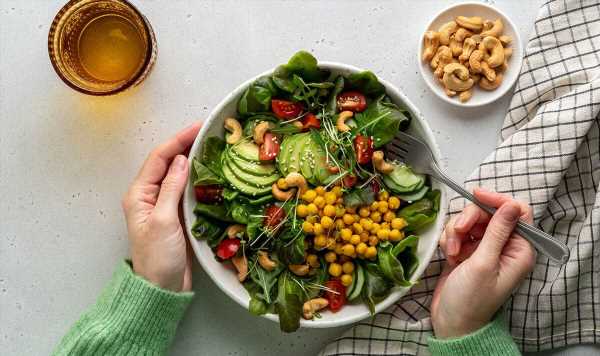High cholesterol: Nutritionist reveals top prevention tips
A big fan of fibre-rich foods, Dr Klodas, has explained why such foods are good for you. “As a cardiologist, I always tell patients that lowering their LDL [low-density lipoprotein] ‘bad’ cholesterol can help prevent cardiovascular disease,” said Dr Klodas. “Many foods have soluble fibre, which binds cholesterol in the digestive system and drags them out of the body before they get into circulation,” the doctor said.
With that in mind, Dr Klodas strongly recommended incorporating oats into your diet.
“I always stock my kitchen with oats, and typically have half a cup per day,” said Dr Klodas.
“Not only are they high in fibre, they contain plenty of antioxidants, including those that help improve blood vessel function and lower blood pressure.”
While oats can become part of a healthy breakfast menu, there is another fibre-rich food to include in your lunches and dinners.


Ideal for salads, stews and curries, the mighty chickpea packs a punch when it comes to its health benefits.
“They’re packed with potassium and magnesium, both important for blood pressure control,” said Dr Klodas.
“One cup has almost 15 grams of protein, 12 grams of fibre, and one-fourth of your daily iron requirement.”
As for snacking, Dr Klodas suggested eating a handful of almonds as it can provide fibre, protein, and vitamin E.
Don’t miss…
Frequent flu linked to accelerated brain ageing, upping dementia risk[LATEST]
Police employee finds cancerous lump while in the shower[CASE STUDY]
Smelly urine could signal something wrong with your health[SYMPTOMS]
The British Heart Foundation (BHF) states: “If you have high cholesterol, it’s most important to eat less saturated fat.
“Foods that are high in saturated fats are things like fatty and processed meat, pies and pastry, butter, cream, and coconut oil.”
There can be simple dietary swaps you can do to help lower cholesterol levels.
The BHF explains: “The best way to eat a better diet is to swap your saturated fats with foods that are high in unsaturated fat.”

An example includes swapping butter (high in saturated fat) for vegetable oil spreads, such as sunflower or rapeseed oil.
In terms of cooking, if you are a meat eater, you can replace regular mince for lower-fat options.
Even better yet, you can swap red or processed meat for fish, turkey or chicken without the skin.
Plant-based options are also preferable to red meat, such as lentils, soya or Quorn.
Source: Read Full Article
